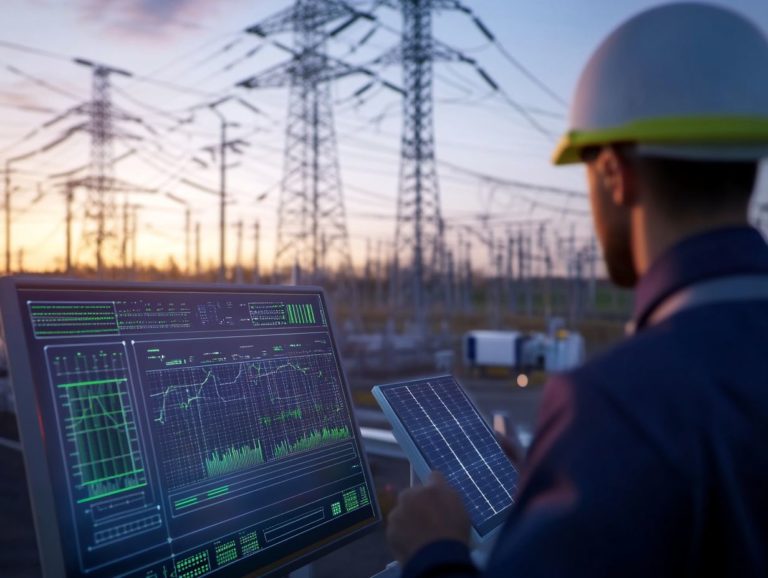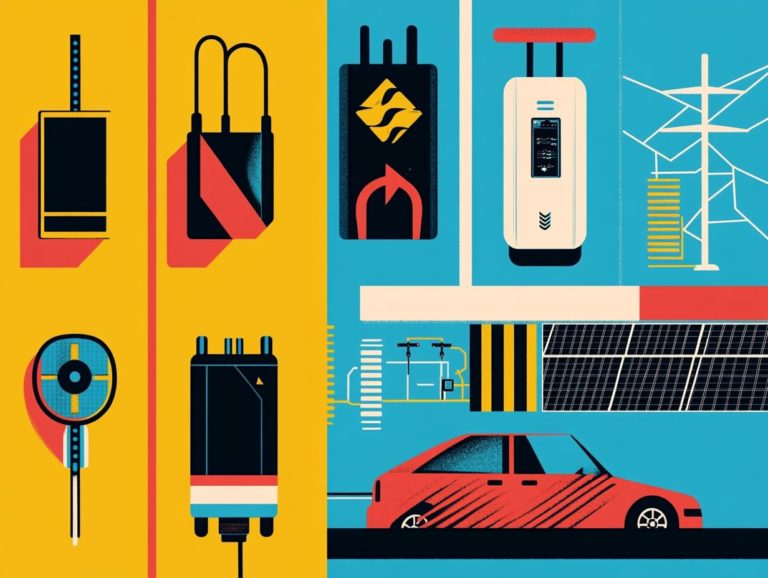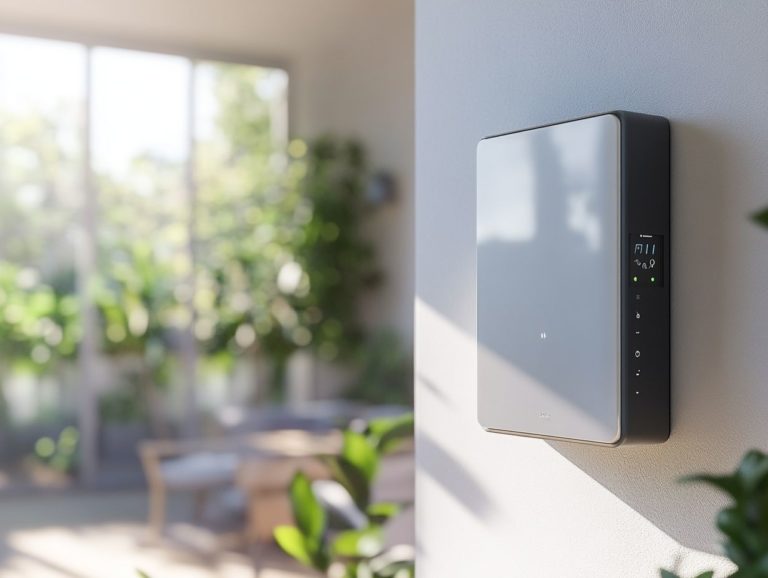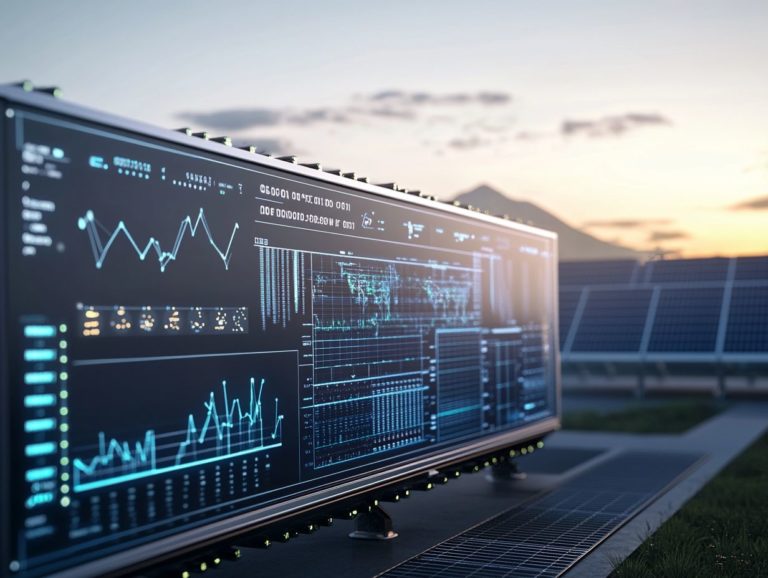Energy Storage and Home Automation: A Perfect Match
In today s fast-paced world, the combination of energy storage and home automation is revolutionizing how you manage your energy consumption.
This exploration delves into the benefits of integrating these technologies, highlighting not just the efficiency and cost savings you can achieve but also their positive impact on the environment.
You’ll discover various types of energy storage systems, from batteries to flywheels and thermal storage, and see how smart home automation elevates your energy management practices.
You will also learn about future trends and innovations shaping this field, providing you with insights into what lies ahead.
Join us in discovering how this powerful combination can transform your life by paving the way for a more sustainable and efficient lifestyle.
Contents
- Key Takeaways:
- Benefits of Combining Energy Storage and Home Automation
- Types of Energy Storage Systems
- How Home Automation Enhances Energy Management
- Future Outlook for Energy Storage and Home Automation
- Frequently Asked Questions
- How do energy storage and home automation work together?
- What are the benefits of combining energy storage and home automation?
- How does energy storage work with home automation?
- Can energy storage and home automation help reduce energy bills?
- Is energy storage and home automation technology expensive?
- Can energy storage and home automation be used to power an entire household?
Key Takeaways:
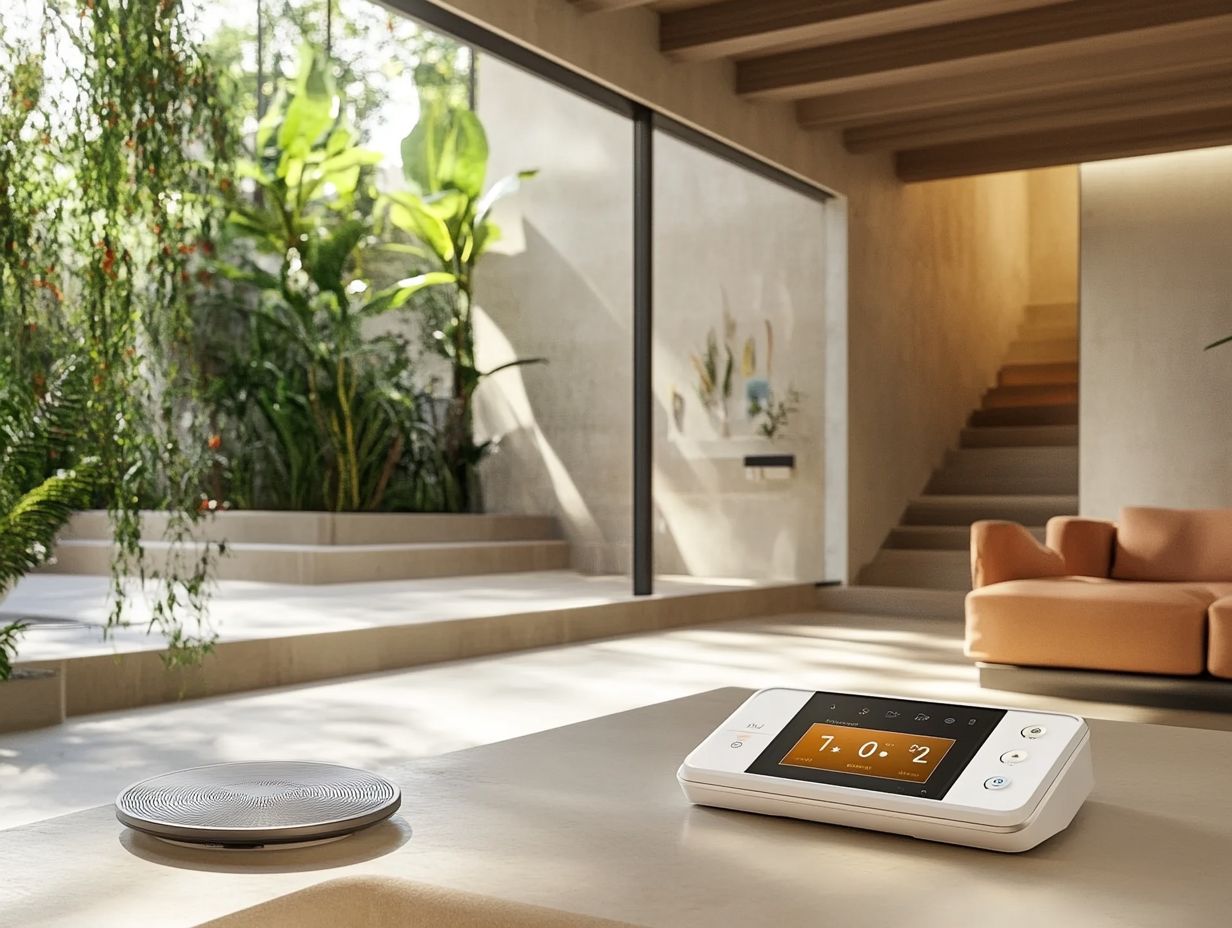
- Maximize efficiency, cost savings, and reduce environmental impact by combining energy storage and home automation.
- Battery, flywheel, and thermal storage are three types of energy storage systems that can be integrated into home automation systems.
- Home automation enhances energy management through smart monitoring and control and integration with renewable energy sources, with potential for future advancements and growth.
Defining Key Concepts
Defining key concepts in renewable energy and smart home technology is essential for homeowners looking to optimize their energy consumption and management strategies.
In this landscape, battery energy storage systems play a vital role. They allow you to store excess energy generated from solar panels during peak sunlight hours for use in the evening or on cloudy days. This approach not only maximizes the efficiency of solar energy but also reduces your reliance on the grid, enhancing your energy independence while promoting environmental sustainability.
Understanding smart devices, such as programmable thermostats and energy monitoring systems, equips you with tools for tracking energy use as it happens, ensuring you minimize waste. For example, smart thermostats can automatically adjust heating and cooling based on occupancy, significantly enhancing energy conservation.
By integrating these technologies, you can contribute meaningfully to environmental protection while also cutting down on your utility bills, embodying a holistic approach to energy management and sustainable living.
Benefits of Combining Energy Storage and Home Automation
Combining energy storage solutions, such as battery energy storage systems, with smart home technology presents a wealth of benefits for homeowners. You’ll experience heightened energy efficiency, streamlined energy management, and lowered energy costs.
This integration gives you the power to monitor your energy consumption in real time, allowing you to fine-tune your usage with smart devices think smart thermostats, smart plugs, and smart lighting systems.
By improving your interaction with the grid and promoting sustainable living, this combination sets the stage for a smarter, more energy-independent home environment tailored to your needs.
Efficiency and Cost Savings
Efficiency and cost savings are essential in today s smart home landscape, as homeowners increasingly seek solutions to reduce energy usage while maximizing the performance of their energy management systems.
Implementing smart appliances, like energy-efficient refrigerators and washing machines, plays a pivotal role in this transformation. These devices not only consume less energy but often come with features that enable you to monitor your usage patterns in real time.
When paired with energy monitoring systems that track consumption and provide insights on peak usage times, you can strategically schedule high-energy tasks during off-peak hours. This proactive approach not only slashes your electricity bills but also supports a sustainable lifestyle by minimizing your carbon footprint.
Embracing these technologies becomes a win-win, offering you both financial benefits and a positive impact on the environment.
To start your journey toward energy efficiency, explore the various energy storage solutions and smart devices available today!
Environmental Impact
The environmental impact of integrating renewable energy solutions and smart home technology is profound. These innovations play a crucial role in promoting environmental protection and sustainable living.
By harnessing energy from sources like wind, geothermal, and solar power, you can achieve an impressive reduction in greenhouse gas emissions up to 70% in some cases. Smart technologies optimize energy consumption through intelligent systems that manage heating, cooling, and lighting based on real-time data.
For instance, homes equipped with energy-efficient appliances use significantly less energy, with potential savings of up to 30% annually. This approach enhances energy efficiency and cultivates a community dedicated to environmental stewardship, paving the way for a greener, more sustainable future.
Types of Energy Storage Systems
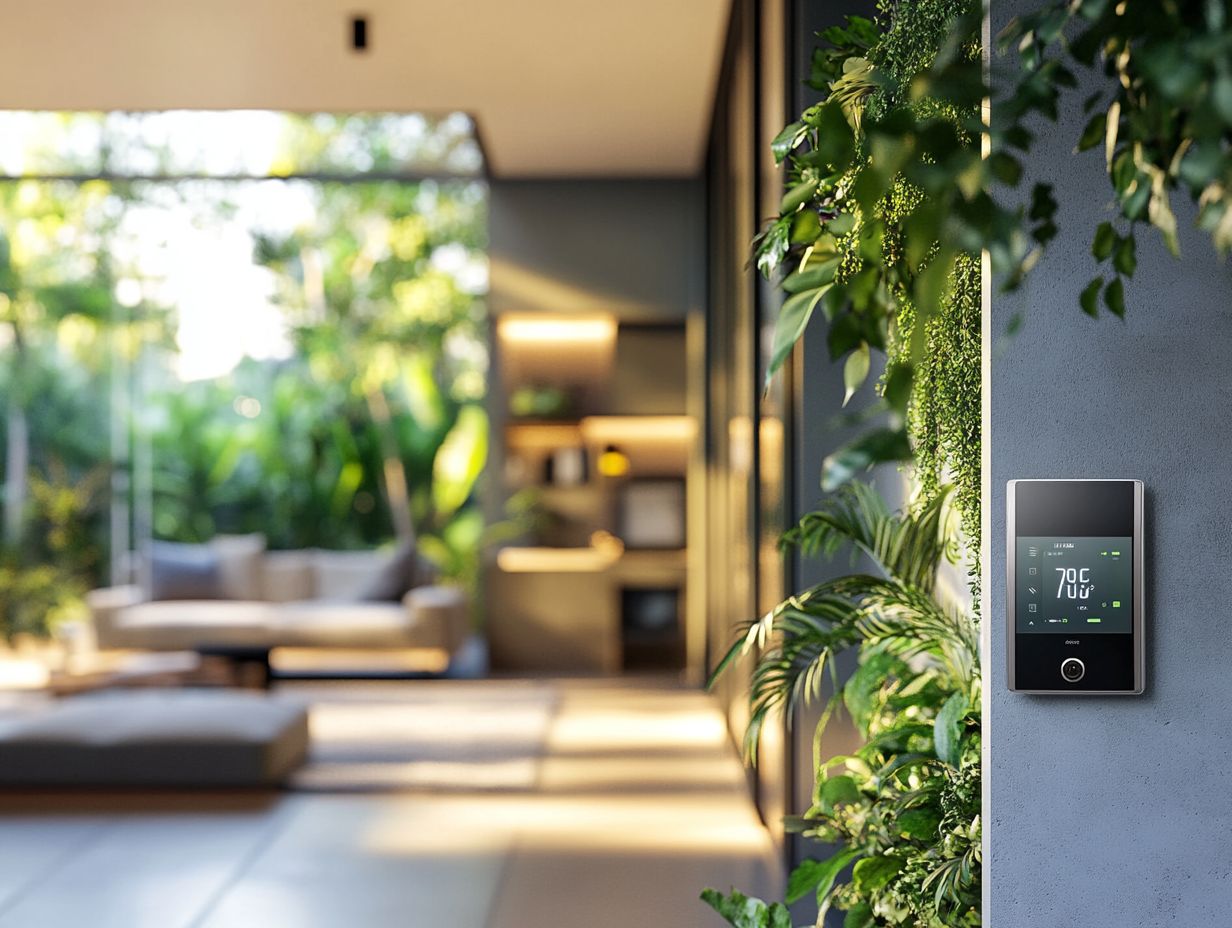
Energy storage systems are essential for effective energy management. They offer a range of technologies tailored to the diverse needs of homeowners and businesses. Among these, battery storage stands out for maximizing renewable energy use, while flywheel storage delivers rapid response capabilities. Thermal storage presents innovative solutions for heating and cooling.
Each type of energy storage system has its own advantages and challenges. It’s vital for you to understand your options. This knowledge empowers you to achieve optimal energy efficiency and performance tailored to your specific requirements, especially with smart energy solutions for the modern home.
Battery Storage
Battery energy storage systems represent a premier solution for managing energy production and consumption in homes, especially when paired with solar panels. These systems efficiently capture and store excess energy generated from renewable sources, allowing you to use that energy during peak demand or low production periods. This bolsters your energy independence and diminishes reliance on the grid.
As technology advances, battery storage solutions are becoming more efficient and accessible. They pave the way for sophisticated energy management strategies.
Homes with battery storage save up to 30% on their energy bills. By lowering peak demand costs and reducing reliance on costly grid electricity, these systems create a significant financial impact.
For example, if your household has a 10 kWh battery, it can store surplus solar power for use during the evening hours when energy rates tend to spike. This makes it easier for you to lead a sustainable lifestyle and enhances the integration of renewable energy into the grid, contributing to a cleaner environment. Additionally, exploring the connection between smart homes and energy independence can further optimize your energy usage.
With the rise of electric vehicles, battery systems can further amplify their value by serving as a dual-use resource in contemporary energy management scenarios.
Flywheel Storage
Flywheel storage systems harness energy created by movement to deliver rapid energy discharge and recharge capabilities. These systems excel in energy management, effectively balancing supply and demand, especially in environments where intermittent power from renewable sources requires supplementary energy solutions.
By embracing flywheel technology, you can achieve enhanced stability in your energy supply, contributing to greater efficiency.
These systems operate on the principles of angular momentum, storing energy created by movement in a rotating mass. This innovative approach enables swift energy transfer and significantly reduces losses typically associated with traditional energy storage methods like batteries.
This technology is increasingly integrated into renewable energy systems, electric vehicles, and grid stability projects, boosting the resilience of modern energy infrastructures. With the growing demand for reliable energy sources, adopting flywheel systems will play a pivotal role in shaping a more sustainable energy landscape while addressing the challenges posed by fluctuating energy demands.
Thermal Storage
Thermal storage systems are essential for your energy management strategy. They allow you to store excess thermal energy for future use, significantly enhancing energy efficiency in both residential and commercial environments.
By shifting your energy consumption patterns, you can capitalize on lower energy rates during off-peak periods while optimizing your heating and cooling usage. Integrating thermal storage into your energy strategy can lead to substantial savings and a more sustainable approach.
There are various types of thermal storage systems available, including heat storage that uses temperature changes, latent heat storage, and thermochemical storage. Each offers distinct benefits tailored to specific applications.
For example, heat storage systems, such as water tanks, are frequently employed for both residential heating and industrial processes. Data suggests that buildings equipped with thermal storage can lower peak demand by up to 15%, highlighting their crucial role in reducing energy costs.
Consider real-world case studies from companies that have adopted phase-change materials. These examples reveal remarkable efficiencies, yielding a 20% reduction in overall energy consumption. Embracing these systems not only bolsters your energy management efforts but also advances your sustainability objectives.
How Home Automation Enhances Energy Management
Home automation elevates your energy management experience. It equips you with cutting-edge tools and smart devices designed to optimize energy usage and enhance overall efficiency.
By integrating systems like smart thermostats, smart plugs, and energy monitoring solutions, you can effortlessly track and manage your energy consumption in real-time.
This automation translates into significant energy savings. It also fosters a culture of sustainability and responsible energy use in your home.
Smart Energy Monitoring and Control
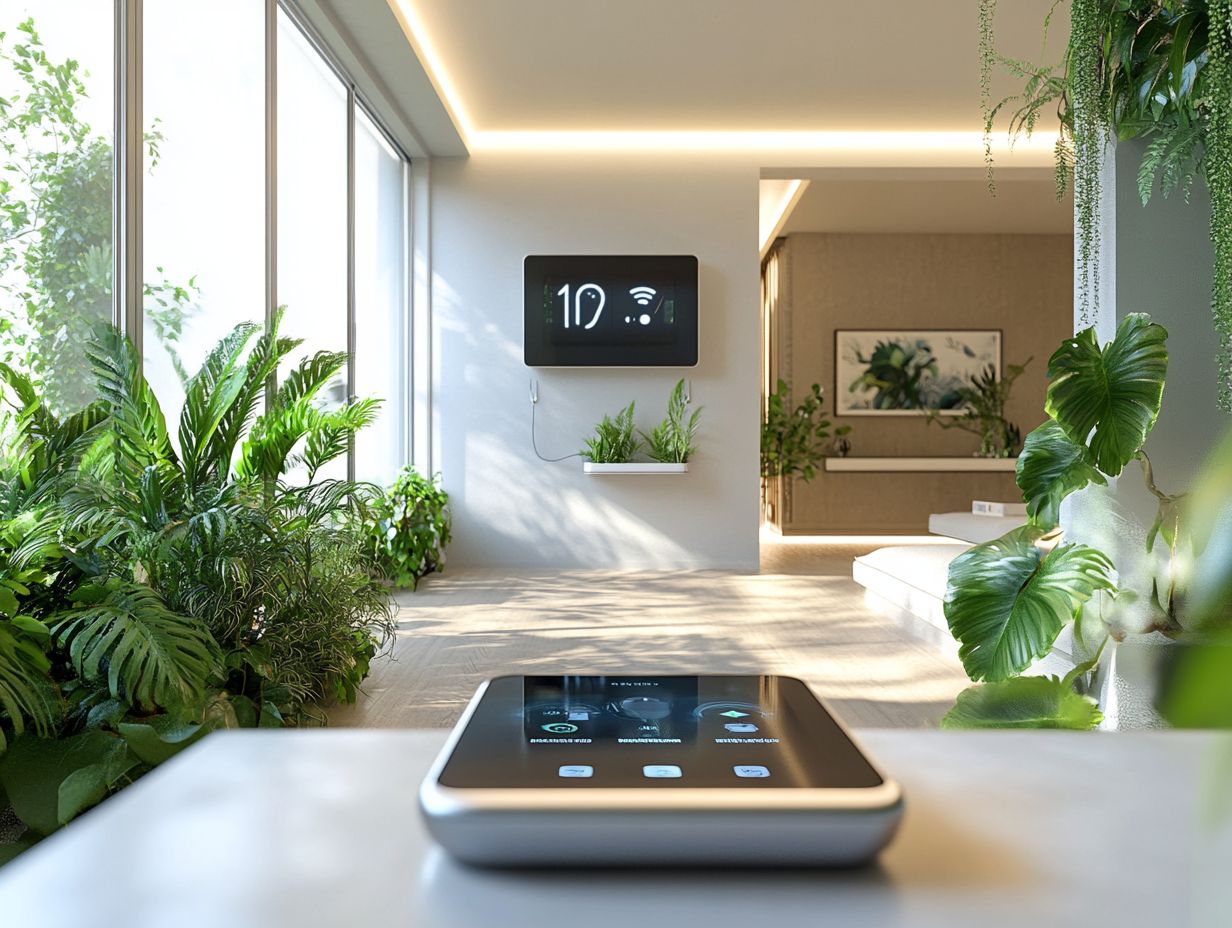
Smart energy monitoring and control systems offer invaluable insights into your energy usage patterns, giving you the power to make informed decisions about your consumption habits. By utilizing IoT devices and smart meters, you can continuously track your energy usage, identify inefficiencies, and implement strategies to optimize your energy management.
This real-time data lets you make proactive adjustments, ensuring that your home remains energy-efficient while keeping costs in check.
These smart tools not only help you reduce your bills but also significantly contribute to environmental sustainability by decreasing overall energy demand. Popular devices like the Nest Learning Thermostat and Philips Hue Smart Lighting system offer remote control and automation features, further encouraging efficient energy use. Smart plugs enable you to schedule device usage, minimizing waste.
Embracing such technology cultivates a culture of awareness and accountability regarding energy consumption, making it a worthy investment for those aiming for a more sustainable lifestyle.
Integration with Renewable Energy Sources
Integrating renewable energy sources like solar panels with smart home technology is crucial for maximizing your energy efficiency and championing sustainability. By utilizing energy storage solutions alongside renewable energy generation, you can effectively capture and store excess energy. This reduces your reliance on traditional grid power and enhances your energy independence.
This synergy optimizes your energy management and contributes to a cleaner, greener environment.
With energy demands soaring, now is the time to embrace renewable energy solutions for a sustainable future! Studies indicate that residential solar energy can cut a household’s carbon footprint by up to 80%. When you incorporate energy storage systems, you can make better use of renewable energy during peak demand times, ultimately making your entire setup more efficient. Additionally, understanding the importance of smart home tech in energy management can further enhance your energy efficiency efforts.
By embracing this technology, you re not just slashing your utility bills; you re also supporting a broader transition towards sustainable practices. As the adoption of renewable technologies accelerates, it’s vital for communities to recognize how these integrated solutions can significantly enhance energy resilience and sustainability.
Explore thermal storage and home automation solutions today to transform your energy management!
Future Outlook for Energy Storage and Home Automation
The future of energy storage systems and home automation is set for remarkable advancements, propelled by new technology and a growing emphasis on energy efficiency and sustainability.
As the demand for renewable energy escalates, you can anticipate continuous improvements in battery energy storage systems, smart devices, and automation capabilities. This evolution enhances your energy management practices and provides insights into the future of home energy management with smart tech, giving you the power to attain greater energy independence while contributing meaningfully to environmental protection.
Advancements and Potential for Growth
Recent advancements in energy storage and home automation technologies reveal a promising landscape for growth in the renewable energy sector, setting the stage for powerful and efficient systems.
Innovations in battery technology, smart home devices, and energy management solutions are continually evolving, allowing you to maximize your energy savings and streamline your energy usage.
This growth boosts your energy independence and fosters broader adoption of sustainable living practices within your community.
For instance, the introduction of lithium-ion batteries rechargeable batteries commonly used in electronics and electric vehicles has significantly lowered costs while enhancing storage capacity. This enables households like yours to store surplus solar energy for use during peak hours.
Smart thermostats can now learn your habits and adjust temperatures automatically, resulting in impressive energy savings of up to 10-15%. A recent study from the International Renewable Energy Agency (IRENA) estimates that energy storage capacity could reach 200 gigawatt-hours by 2030, highlighting the burgeoning opportunities for residential energy solutions and the future of energy efficiency through smart homes.
These advancements create a connected system that enhances your convenience and nurtures a culture of sustainability, paving the way for widespread adoption in your everyday life.
Frequently Asked Questions
How do energy storage and home automation work together?

Energy storage and home automation are a perfect match. Energy storage systems can be integrated with home automation technology to optimize energy usage and provide greater control over household energy consumption.
What are the benefits of combining energy storage and home automation?
The combination allows for greater energy efficiency, cost savings, and convenience. It also promotes sustainability by reducing reliance on traditional energy sources.
How does energy storage work with home automation?
Energy storage systems store excess energy produced by renewable sources or during off-peak hours. They can be controlled through home automation technology to power household appliances and devices when needed.
Can energy storage and home automation help reduce energy bills?
Yes, combining these technologies can help reduce energy bills by using stored energy during peak hours, when electricity rates are typically higher, and by optimizing energy usage throughout the home.
Is energy storage and home automation technology expensive?
The cost varies depending on the specific systems and features chosen. However, the long-term cost savings and benefits make it a worthwhile investment for many homeowners.
Can energy storage and home automation be used to power an entire household?
Yes, with the right combination of technology, it is possible to power an entire household. This can include heating and cooling systems, lighting, and other household appliances and devices.

